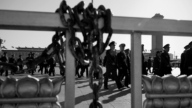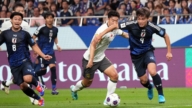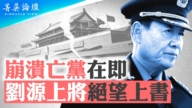【新唐人2013年04月29日讯】在中国大陆各类冤假错案、恶性劳教等丑闻不断,中共政法系统弊端日益凸显的情况下,北京当局也频频发声倡议司法公正。日前,最高人民法院举办座谈会,召集专家学者探讨如何“提升司法公信力”,并宣称“司法公正”已经成为最高法院以后的工作主题。那么,在中共独裁体制存在中国的现况下,中国有可能司法独立吗﹖还是像专家学者所指称的那样——中国“依法治国”只能是幻梦一场﹗
今年中共两会当选最高人民法院院长的周强,4月26号召集专家学者,举办了一场所谓“提升司法公信力”的座谈会,征求专家学者和律师界代表们的意见和建议。座谈会分为上、下午两场,被邀请的专家有17名,律师则有3人。
周强在会上声称,要让群众在每一个司法案件中都感受到公平正义,推进公正司法,不断提升司法公信力,落实依法治国的要求。这已经是他在这个月之内就“司法公正”的第二次表态。
北京律师董正伟:“最近一个时期法院出现了这么多错案、冤案。这个时候法院的心理就是,过去西方国家有一个思想家的一句话,一个不公正的裁判,它污染的是一个河流。这样的话,它对中国的这些法院司法的公正性和公信力,都产生了一个极大的怀疑和不信任。”
周强在座谈会上表示,十八大以来,中共新领导层对依法治国很重视,这是提高司法公信力,促进依法治国的新契机。
中国“东南大学”法学教授张赞宁:“(中共)在建政以后,一直都在提司法公正,但是这个司法却反而变得越来越不公正。毛泽东提过、邓小平提过、江泽民也提过,也都讲过要司法公正。但是在江泽民时期,司法是越来越不公正,甚至是司法行政化、司法黑社会化,根本就不依法办事。”
中共新任总书记习近平上台后,曾在不同场合喊出“依法治国”的口号。他在最近主持召开的中央政治局会议中,还提出“照镜子、正衣冠、洗洗澡、治治病”的十二字方针,并说这是在新形势下作出的一个“党要管党、从严治党”的重大决策。
《德国之声》评论文章认为,“党要管党”实际上是“一党专政”的核心,就是共产党要自己管自己,不容许人民染指权力。而今天的司法不公、权钱交易、腐化堕落、贫富悬殊的病态中国,都是在历次“党要管党”的运动中逐渐加码升级而形成的。
中国“东南大学”法学教授张赞宁:“只有司法独立了,才有可能做到司法公正。在司法不独立的情况下,比如大陆的司法要受制于某一个政党,受制于某一个部门、或者受制于某一个领导人,或者司法要由行政部门来干预的话,那么这个公正是永远不可能做到的。”
文章还指出,中共执政64年期间,从来没有认真执行过《宪法》。《宪法》对中国人民权利的保障,始终像一张白纸,没有任何约束力。
香港《开放》杂志针对中共新领导层高喊的“依法治国”口号,也在4月初发表了评论文章。
这篇题为《十八大后的中国法治幻梦》文章,分析了近期发生的几桩涉及中国法治状况的事件。文章指出,重庆的“平反黑打”离不开政治摆布,山东维权人士陈光诚侄子“陈克贵案”,离不开枉法裁判,“爆料反腐”离不开纪委插手,湖南邵阳维权人士“朱承志案”则离不开暴力疯狂。而这些都不是中共十八大后有意推动司法改革或迈向法治的先声,而是中国法治状况持续沉沦的铁证。
文章得出结论,中共专政体制瓦解之日,才是司法真正独立之时。
采访/易如 编辑/李明飞 后制/陈建铭
The Supreme People’s Court Collected Advice from Scholars:
Is Juridical Justice a Dream?
In China, there have been so many cases that were wrong,
false and unjustly repudiated.
The disadvantages of the Chinese Communist Party’s (CCP)
politics and law system have become more and more prominent.
In this situation, the CCP in Beijing has made
frequent calls for juridical justice.
Recently the Supreme People’s Court held a symposium with
specialists and scholars to discuss enhancing juridical credibility.
“Juridical justice” was the headline topic of the
Supreme People’s Court for the future.
Nevertheless, is juridical justice possible in
the CCP’s one-party dictatorship regime?
Is it possible that the Judiciary can be independent?
Or is the CCP’s slogan “ruling in accordance with the law”
nothing but a dream?
Zhou Qiang was elected as President of the
Supreme People’s Court in the National Congress this year.
On April 26th he held the symposium “Enhance the Credibility
of the Judiciary” with scholars and specialists.
Zhou Qiang collected advice from the attendees
of the symposium.
There were two sessions; morning and afternoon.
17 specialists were invited, but only three lawyers.
Zhou Qian claimed in the symposium that
very person and every case will be addressed with justice.
Judicial justice will be promoted so that
the credibility of the judiciary can be improved.
This way ruling the country by law can be realized.
This is the second time that Zhou made comments on “judicial justice".
Dong Zhengwei, a lawyer working in Beijing, “Recently, there
have been many cases of wrong, false and unjust judgments.
A western ideologist once said one unfair judgment
is like a polluted river, which would make the sea toxic.
Therefore, every unjust case will cause a great deal of
suspicion and mistrust to the CCP’s credibility of judiciary.”
In the symposium, Zhou Qiang claimed the new
CCP leadership emphasizes ruling the country with law.
It’s a good timing to enhance the creditability of judiciary.
Zhang Zanning, a law professor from Southeastern
University in China: “Since the CCP founded the regime, it has been claiming judicial justice.
Nevertheless, it has become more and more unjust.
Mao Zedong, Deng Xiaoping and Jiang Zemin
all claimed to realize judicial justice.
However, especially in Jiang Zeming’s office term,
the judicial justice has been deteriorating rapidly.
Judicature became administrative-related
and controlled by gangs.
It was impossible to address the justice according to law.”
Since Xi Jingping took the presidency, he called for
“ruling the country according to law” on various occasions.
In the recent political bureau meeting,
Xi proposed a guideline phrase;
“Look into the mirror, sort out your clothes,
take a bath, see a doctor.”
In the new political situation, he proposed,
“the party should manage the party itself;
the party should be supervised more strictly”.
The commentary article from “the Voice of Germany” stated
the claim “the party should manage the party”
still means “one-party dictatorship”.
It means that the CCP will manage itself and
ordinary people cannot get any power.
Nonetheless, today’s juridical injustice, money and
power trade, rampant corruption and polarization of the rich and poor,
are all caused by and escalated in the political
activities of “the party managing the party”.
Zhang Zanning: “only when judicature is independent,
can judicial justice be realized.
If judicature is still controlled by some department, official,
or the CCP intervenes, judicial justice will never happen.”
The article also stated that the CCP has never
seriously implemented the Constitution.
The Constitution is nothing but piece of paper,
which cannot guarantee people’s rights.
Hong Kong’s “Open Magazine” also published
an article on the CCP’s slogan “running the country in accordance with the law”.
The article was entitled “China’s Dream of Rule
of Law after the 18th National Congress”.
It described the CCP’s current judicial situation
by analyzing a couple of recent cases.
The article claimed that Chongqing’s
“redressing wrong cases” is political manipulation.
Cheng Guangcheng’s nephew was still sentenced
in an unjust manner.
“Reporting corruption” is also controlled by
the CCP’s Discipline Committee.
The case of Zhu Chengzhi, the human right activist,
is still full of violence.
All of those facts are not the herald of the CCP’s
“ruling the country in accordance with the law”.
But they are the firm evidence of the
CCP’s judicature deteriorating further.
The article draws the conclusion: the day the CCP dictatorship
disintegrates is the day of realizing juridical independence.




























